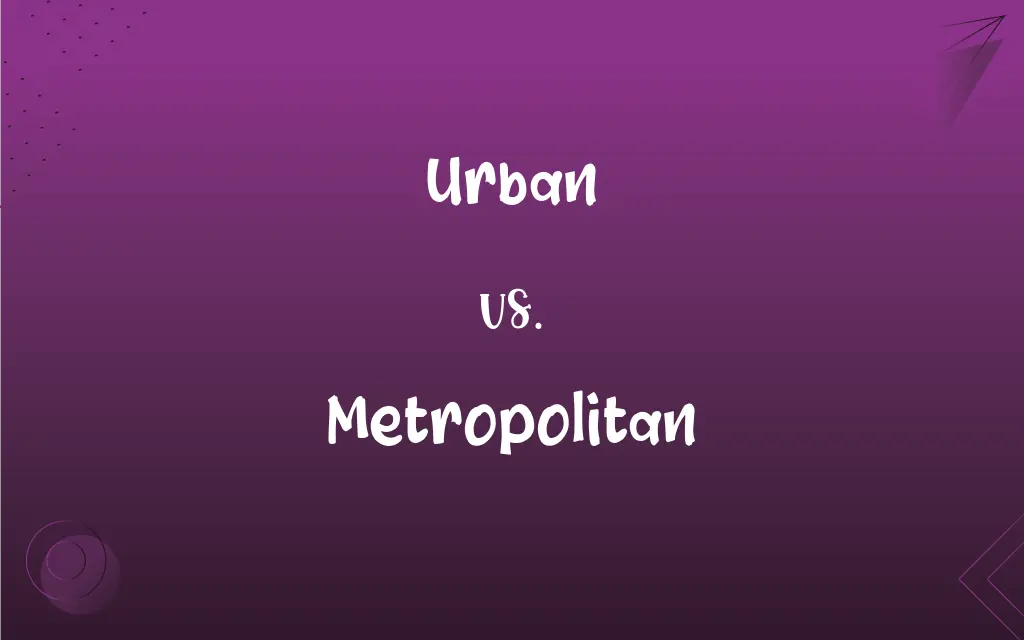Urban vs. Metropolitan: What's the Difference?
Edited by Aimie Carlson || By Janet White || Published on November 7, 2023
Urban refers to cities and towns, while Metropolitan encompasses a larger area including cities, towns, and suburbs.

Key Differences
Urban areas are characterized by higher population density and vast human features in comparison to areas surrounding them. These areas often exhibit the characteristics of a city or town, encompassing residential, commercial, and industrial zones. Metropolitan areas, however, extend beyond the limits of urban areas, including not only the city itself but also the surrounding communities that have a high degree of economic and social integration with the core urban area. They typically consist of one or more urban areas, as well as satellite cities, towns, and intervening rural areas that are socio-economically linked to the urban core, often through commuting.
While urban areas are defined by their compact and densely populated nature, primarily consisting of built environments like buildings, roads, and infrastructure, metropolitan areas cover a broader spectrum. These areas are a blend of urban and suburban environments, indicating a region that may encompass multiple cities and towns which are economically and socially connected. Metropolitan areas usually have a more diverse economic base and a larger population than urban areas.
The term urban typically pertains to the characteristics of city life, including higher population density, extensive infrastructure, and a focus on commercial and residential development. Metropolitan, on the other hand, refers to a larger region that includes not only the urban core but also its surrounding suburbs and satellite communities. Metropolitan areas often have a more complex administrative and political structure, coordinating policies and services across multiple urban and suburban jurisdictions.
In an urban setting, public transportation, commercial, and cultural amenities are often highly concentrated, making it a hub for business, culture, and social interactions. Metropolitan areas, while including these urban centers, also offer a mix of suburban and sometimes even rural living environments. They provide a gradient of lifestyles, from the bustling city life to quieter suburban areas.
Comparison Chart
Definition
Pertaining to a city or town.
Pertaining to a region that includes a city and its surrounding areas.
ADVERTISEMENT
Size
Smaller, confined to city limits.
Larger, extends beyond city to include suburbs.
Population Density
High, due to concentration in a limited area.
Varied, high in core areas but decreases in suburbs.
Development
Mainly commercial and residential.
Mix of urban, suburban, and sometimes rural.
Lifestyle
Often fast-paced, with numerous amenities.
Offers a range of urban to suburban lifestyles.
Urban and Metropolitan Definitions
Urban
Pertaining to the lifestyle or characteristics of city life.
She enjoys the urban culture, with its diverse food and arts scene.
ADVERTISEMENT
Metropolitan
Involving or characteristic of a large, bustling city and its nearby areas.
The metropolitan lifestyle offers both urban energy and suburban comfort.
Urban
Relating to a city or town.
The urban landscape of New York is constantly evolving.
Metropolitan
Associated with the sophisticated and diverse nature of large city areas.
Metropolitan fashion trends often set the tone for the rest of the country.
Urban
Characterized by higher population density and vast human features.
The urban areas are bustling with activity day and night.
Metropolitan
Pertaining to a region that includes a central city and its surrounding suburbs.
He lives in the metropolitan area, commuting to the city for work.
Urban
Denoting popular culture in city areas, often used to describe music or fashion.
Urban music has been influential in shaping modern pop culture.
Metropolitan
Relating to a metropolis, which is a large and densely populated urban area.
The metropolitan area of Los Angeles is expansive.
Urban
Of, relating to, or located in a city.
Metropolitan
Denoting an area that encompasses multiple urban and suburban communities economically and socially connected.
The Washington D.C. metropolitan region is rich in history and diversity.
Urban
Characteristic of the city or city life.
Metropolitan
Of, relating to, or characteristic of a major city
Crowded metropolitan streets.
A metropolitan newspaper.
Urban
Related to the (or any) city.
Urban life
Urban traffic
Metropolitan
Of or constituting a large city or urbanized area, including adjacent suburbs and towns
The Dallas-Fort Worth metropolitan area.
A metropolitan county.
Urban
Characteristic of city life.
Metropolitan
Of, relating to, or constituting the home territory of an imperial or colonial state.
Urban
Relating to contemporary African American culture, especially in music.
Metropolitan
Of or relating to an ecclesiastical metropolitan.
Urban
(of inhabitants or residents) Black; African American.
Metropolitan
A citizen of a metropolis, especially one who displays urbane characteristics, attitudes, and values.
Urban
Of or belonging to a city or town; as, an urban population.
Metropolitan
In the Western Christian churches, a bishop with provincial powers, with some authority over suffragan bishops.
Urban
Belonging to, or suiting, those living in a city; cultivated; polite; urbane; as, urban manners.
Metropolitan
In most Eastern Orthodox churches, a bishop who is head of an ecclesiastical province and ranks next below the patriarch.
Urban
Relating to or concerned with a city or densely populated area;
Urban sociology
Urban development
Metropolitan
In the Greek Orthodox church, a bishop ranking next below an archbishop.
Urban
Located in or characteristic of a city or city life;
Urban property owners
Urban affairs
Urban manners
Metropolitan
(Orthodox Christianity) A bishop empowered to oversee other bishops; an archbishop.
Urban
Involving or related to cities and towns, especially as distinct from rural areas.
Urban development has transformed the skyline over the years.
Metropolitan
The inhabitant of a metropolis.
Metropolitan
(Orthodox Christianity) Pertaining to the see or province of a metropolitan.
Metropolitan
Of, or pertaining to, a metropolis or other large urban settlement.
Metropolitan
Of or pertaining to the parent state of a colony or territory, or the home country, e.g. metropolitan France
Metropolitan
Of or pertaining to the capital or principal city of a country; as, metropolitan luxury.
Metropolitan
Of, pertaining to, or designating, a metropolitan or the presiding bishop of a country or province, his office, or his dignity; as, metropolitan authority.
Metropolitan
The superior or presiding bishop of a country or province.
Metropolitan
An archbishop.
Metropolitan
A bishop whose see is a civil metropolis. His rank is intermediate between that of an archbishop and a patriarch; as, the metropolitan of Constantinople.
Metropolitan
In the Eastern Orthodox Church this title is given to a position between bishop and patriarch; equivalent to archbishop in western Christianity
Metropolitan
A person who lives in a metropolis
Metropolitan
Relating to or characteristic of a metropolis;
Metropolitan area
FAQs
What defines an urban area?
An urban area is defined by its high population density, extensive infrastructure, and concentration of residential and commercial buildings.
What is a metropolitan area?
A metropolitan area includes a central city and its surrounding suburbs and towns that are economically and socially integrated with the city.
Can a city be both urban and metropolitan?
Yes, a city can be described as urban in its own right and also be part of a larger metropolitan area.
How does population density differ between urban and metropolitan areas?
Urban areas typically have higher population density, while metropolitan areas have varied density, decreasing in suburban and rural zones.
What kind of lifestyle is associated with urban areas?
Urban areas often have a fast-paced lifestyle with numerous cultural, commercial, and social amenities.
Are metropolitan areas more diverse than urban areas?
Metropolitan areas often have more diversity as they encompass a wider range of communities and lifestyles.
Is public transportation more prevalent in urban or metropolitan areas?
It’s typically more concentrated in urban areas but can extend into metropolitan regions.
Is a metropolitan area larger than an urban area?
Yes, a metropolitan area is typically larger as it includes both the urban core and its surrounding regions.
What kind of governance is found in metropolitan areas?
Metropolitan areas can have complex governance structures coordinating policies across multiple urban and suburban jurisdictions.
Can an urban area exist without being part of a metropolitan area?
Yes, some urban areas are standalone cities or towns not integrated into a larger metropolitan region.
Do metropolitan areas have a single center?
Metropolitan areas may have a primary urban center but can also include multiple significant hubs.
Are urban areas always densely built?
Generally, yes. Urban areas are characterized by dense construction and limited open spaces.
Are job opportunities different in urban vs. metropolitan areas?
Urban areas often have more diverse job opportunities, while metropolitan areas offer a mix depending on the region.
Is there a difference in housing styles between urban and metropolitan areas?
Urban areas often have more apartments and high-rises, while metropolitan areas offer a mix, including suburban houses.
Do urban areas have more infrastructure than metropolitan areas?
Urban areas have concentrated infrastructure, while metropolitan areas have a spread-out infrastructure extending to suburbs.
Are metropolitan areas more politically complex than urban areas?
Yes, due to the coordination needed across multiple jurisdictions and communities.
Can rural areas be part of a metropolitan region?
Sometimes, especially if they are economically or socially linked to the urban core.
Does the cost of living differ between urban and metropolitan areas?
Generally, the cost of living is higher in urban areas, but metropolitan regions can offer a range of costs.
Are cultural amenities more common in urban or metropolitan areas?
Urban areas usually have a higher concentration of cultural amenities, but metropolitan areas also offer a wide range.
Do urban areas have more businesses than metropolitan areas?
Urban areas have a higher concentration of businesses, but metropolitan areas have a broader range.
About Author
Written by
Janet WhiteJanet White has been an esteemed writer and blogger for Difference Wiki. Holding a Master's degree in Science and Medical Journalism from the prestigious Boston University, she has consistently demonstrated her expertise and passion for her field. When she's not immersed in her work, Janet relishes her time exercising, delving into a good book, and cherishing moments with friends and family.
Edited by
Aimie CarlsonAimie Carlson, holding a master's degree in English literature, is a fervent English language enthusiast. She lends her writing talents to Difference Wiki, a prominent website that specializes in comparisons, offering readers insightful analyses that both captivate and inform.































































